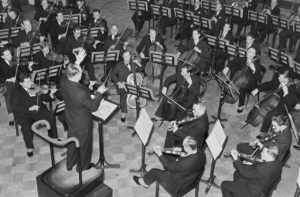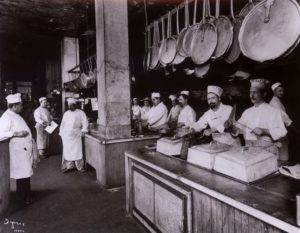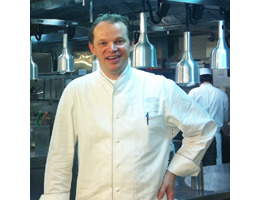In the path of Ives, Johns and Kaftka, I alternate my life between music and hospitality; prevention being better than cure. I decided a couple of years ago to pick-up a day job and start a parallel career in hospitality—allowing me to spend my musical time free of worries. Having to spend quite some time in a hotel and especially in the kitchen, I started finding—or rather searching for—similitudes between music and food. This is where I naturally found that the cook and the musician, the kitchen and the orchestra, food and music, had a lot in common.

© 24904uv1pb7kcgqm1itr5z1j-wpengine.netdna-ssl.com
The similitudes between a cook and a musician are numerous. In regards to their lifestyles, they both share many common traits; late hours, unusual schedules—including working during holidays—or collaborating tightly with a group of people where everyone has a part to play in order for the succeed. A performer, as well as a cook, maintains his level by practicing regularly. Before being able to play challenging pieces, the musician has to learn the basis, and so does the cook. After years and years of repetition and practice, the cook develops an understanding of how food reacts and how it should be handled in order to provide good results, and so does the musician. The more they practice, the better they get. Both devote their life to their art, and through sacrifices and practice achieve the mastery of technical skills and knowledge. They learn from the masters and the ones before them, and constantly seek to find new sonorities, flavours and perfection of their craft. The musician and the chef would not do much without their tools; a violin, a bow, a knife or a pan. The cook rarely sticks to a cuisine, but rather expands his knowledge by learning recipes and foreign food; he takes influences from other cultures to improve his own cooking. In music, these are called styles; and the classical musician will learn from jazz and popular music. The musician improvises; whether it is the jazz improviser, for whom the music is purposely written for spontaneous self-expression or the rock musician who takes a solo. It is also true of the cook who might improvise a dish with the knowledge and ingredients he has in front of him—by making mistakes he will improve, time after time.
Finally, the cook cooks for his guests and the performer performs for an audience. Whilst music doesn’t exist without an ear to hear it, taste doesn’t exist without a palate to try it.
Satie: Trois Morceaux en forme de poire

© i1.wp.com
The orchestra and the kitchen are both known for being well organised. Their structural organisation is very similar, as they group their members depending on, either their instruments—woods, strings etc.—in the case of the orchestra or their areas of preparation—cold, hot, pastry etc.—in the case of the kitchen. Their members all follow a strict hierarchy based on experience and skills; from the commis to the first violin. On top of the pyramid is the conductor or the chef—who often is also the composer or creator.
Of course it would not be possible to draw similarities between musicians and cooks without mentioning the parallels between composers and chefs. Aside from both being musicians and cooks, composers and chefs are creators. In front of them lies a plethora of possibilities and ideas to combine—food or musical ingredients—which through a unique fitting make a unique end product. While the composer might follow a particular blueprint, the chef will follow a recipe, created after years of studying and borrowing from the masters. With an (un)limited amount of ingredients, limitless amount of dishes and pieces are created. It is how the chef and the composer combines these elements that creates the final unique product. There is a particular order in which these creators want to organise the sounds and the flavours; shall that order be different the result will end up being different too. The terminology might differ, but both the chef and the composer are familiar with notions of harmony, balance and counterpoint; consonance and dissonance as well as structure: prelude, hors d’oeuvres, coda and mignardises.
Chefs and cooks are often part-time musicians, while musicians often like to relax by cooking a dish; it all makes sense…







I started do music when I was a kid but now I’m a chef